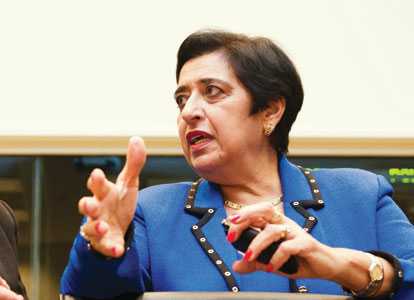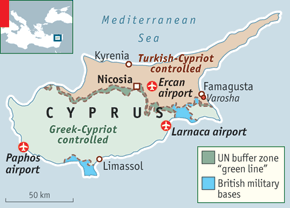NICOSIA

Greek Cyprus’ support of Turkey’s ultimate EU accession process is not a “blank check” as it depends on Turkey’s implementation of all of the bloc’s obligations without any concessions, the country’s foreign ministry has said.
Evaluating the European Commission’s progress report on Turkey released Oct. 12, the ministry said it welcomed the commission’s call for Turkey to increase its efforts for the settlement of the Cyprus problem. However, the Greek Cyprus ministry denied the report’s claim that Turkey was continuing to give public support for talks between the two sides of the island.
“The statements of Turkish Prime Minister [Recep Tayyip Erdoğan] made during his illegal visit to [Turkish] Cyprus in July,” is proof that Turkey is not giving support to the talks, the ministry said. The Mediterranean island has been divided since Turkish troops intervened in 1974 in response to a Greek Cypriot coup seeking union with Greece.
Greek Cyprus also asked the European Union to increase its pressure on Turkey over the Cyprus issue, saying, “The EU ought to make it clear that it is Turkey that is the source of the tension, especially in light of the fact that Turkey has recently intensified its threatening stance in the eastern Mediterranean, creating tension and challenging the sovereign rights of the Republic of Cyprus in a provocative manner and in blatant violation of international law.”
Meanwhile, Turkish Cyprus’ leadership called for domestic support for its agreement allowing Turkey to explore for oil and gas in the Mediterranean.
The Turkish Cypriot Prime Ministry said Oct. 13 that it supported the Continental Shelf Delimitation Agreement signed with Turkey, Anatolia news agency reported Oct. 14.
“Everyone should extend support to the agreement signed with Turkey in order to protect the rights and interests of the Turkish Cypriot people and motherland Turkey,” the Prime Ministry said in a written statement released Oct. 13.
On Sept. 21, Turkey and Turkish Cyprus inked a continental shelf accord in New York to determine their maritime boundaries in the eastern Mediterranean Sea in which the Turkish state oil company will conduct exploratory drilling.
Meanwhile, Turkish Cyprus President Derviş Eroğlu and his Greek counterpart, Demetris Christofias, met in the buffer zone in Nicosia on Oct. 14 as part of intensified talks to find a solution to the Cyprus question. Eroğlu and Christofias will meet twice before holding a tripartite meeting with U.N. Secretary General Ban Ki-moon in New York at the end of the month.
via No blank check for Turkey: Greek Cyprus – Hurriyet Daily News.







 GLOOM has settled over the Cyprus talks. Under a UN special envoy, Alexander Downer, the Greek-Cypriot president (Demetris Christofias) and his Turkish-Cypriot counterpart (Dervish Eroglu since March 2010), have held 100 meetings since September 2008. But politics intrudes: general elections are due in Cyprus (in May) and Turkey (June). Attention will then switch to Cyprus’s European Union presidency in 2012 and its presidential election early in 2013.
GLOOM has settled over the Cyprus talks. Under a UN special envoy, Alexander Downer, the Greek-Cypriot president (Demetris Christofias) and his Turkish-Cypriot counterpart (Dervish Eroglu since March 2010), have held 100 meetings since September 2008. But politics intrudes: general elections are due in Cyprus (in May) and Turkey (June). Attention will then switch to Cyprus’s European Union presidency in 2012 and its presidential election early in 2013.
